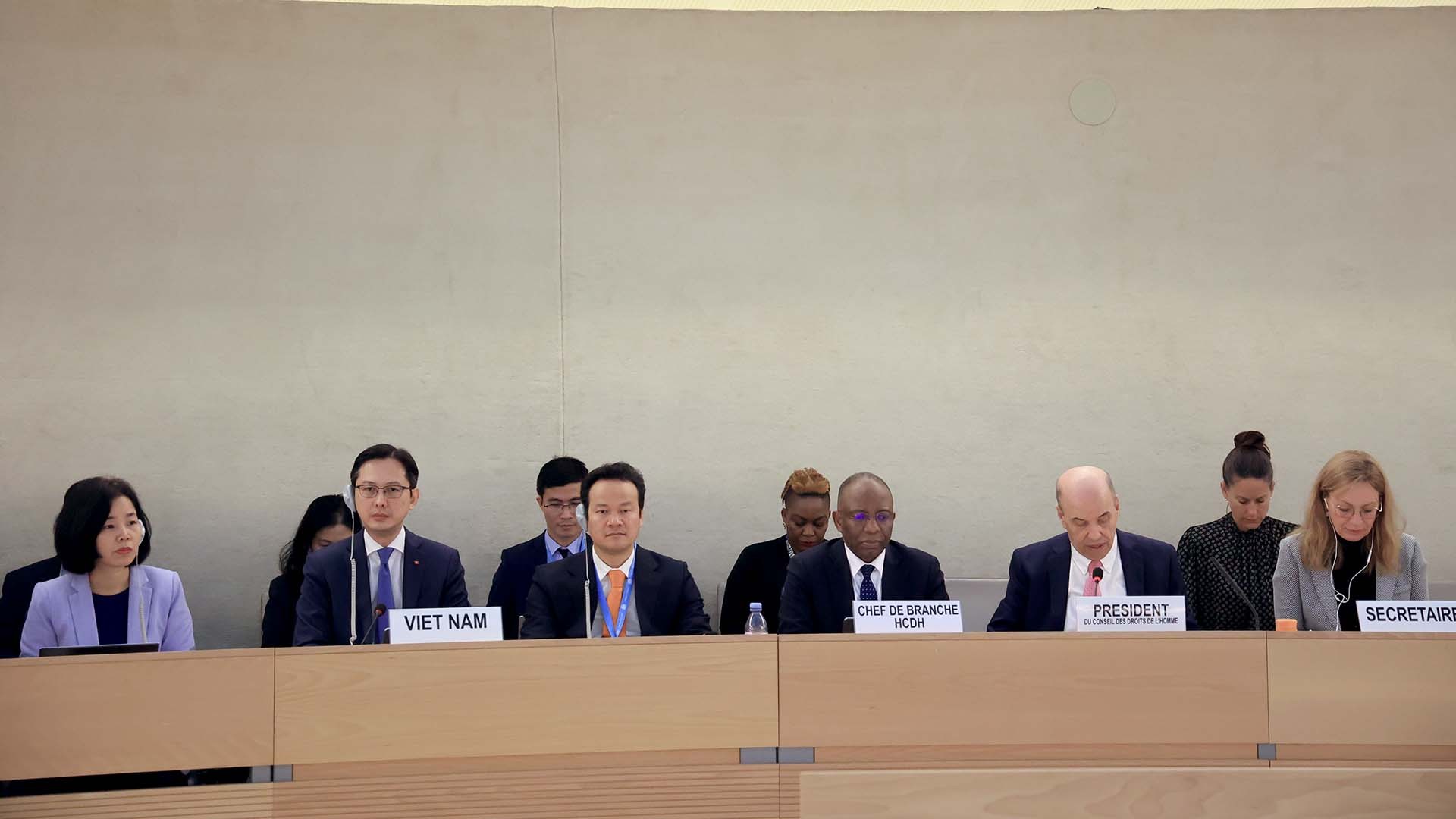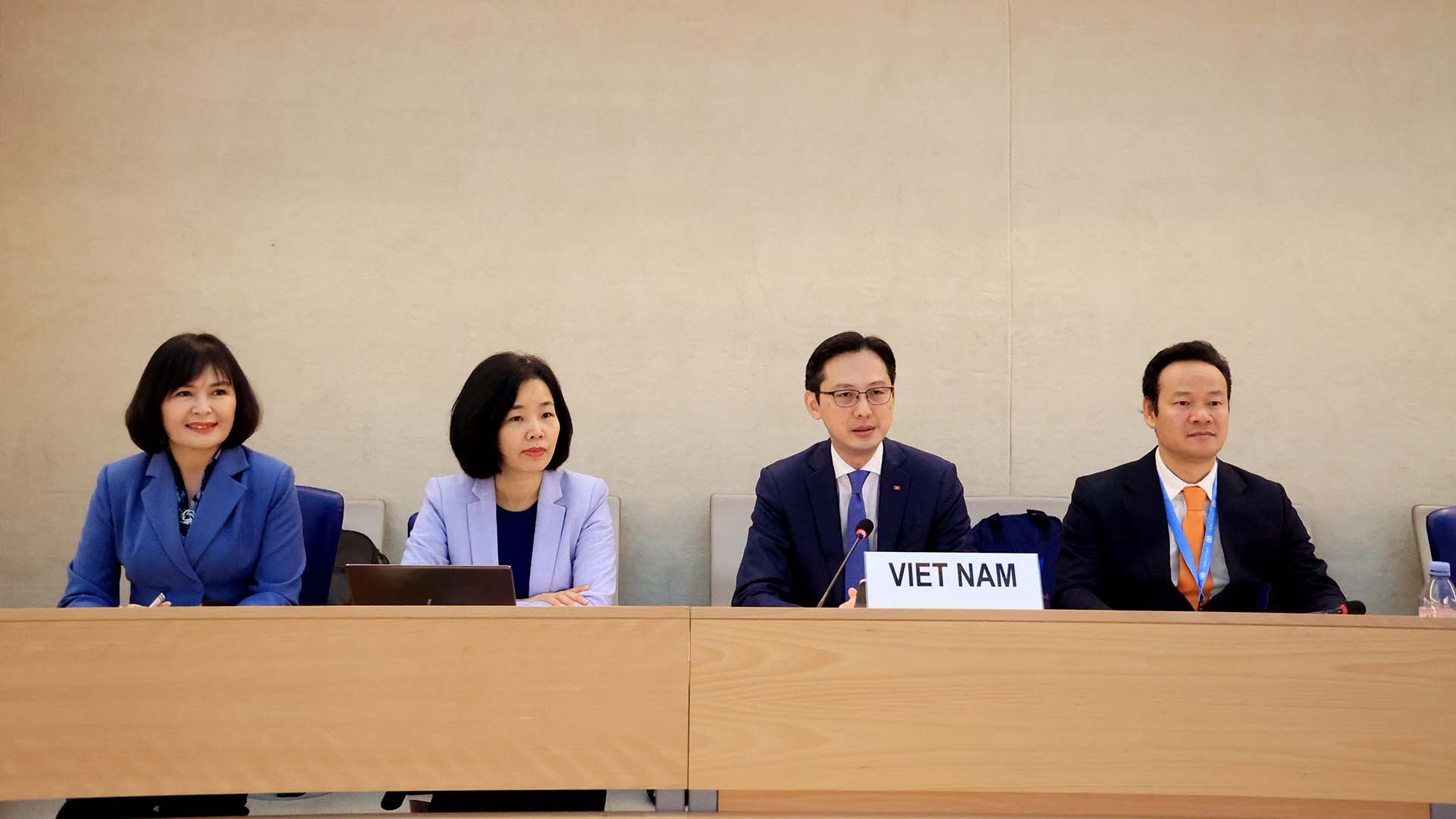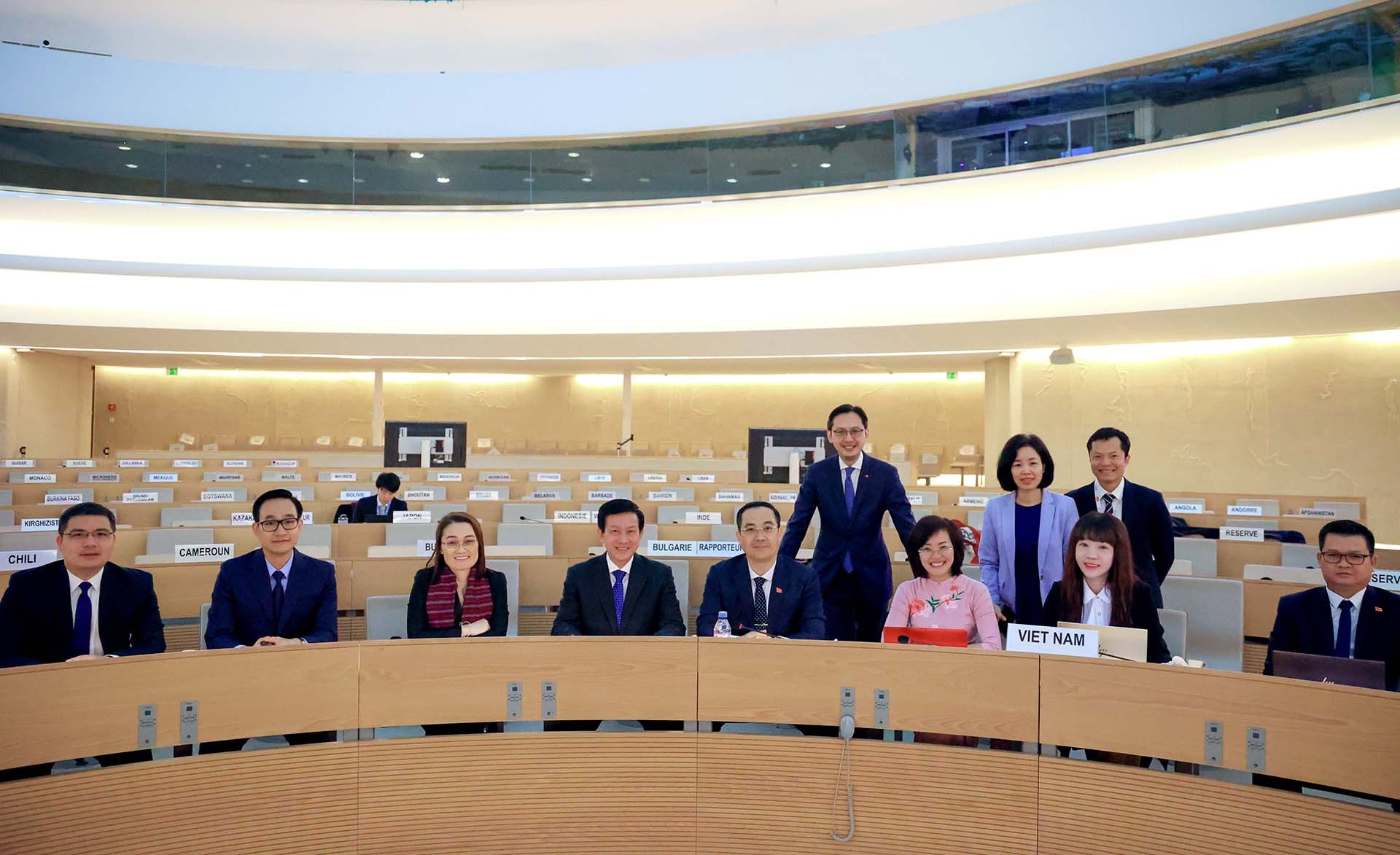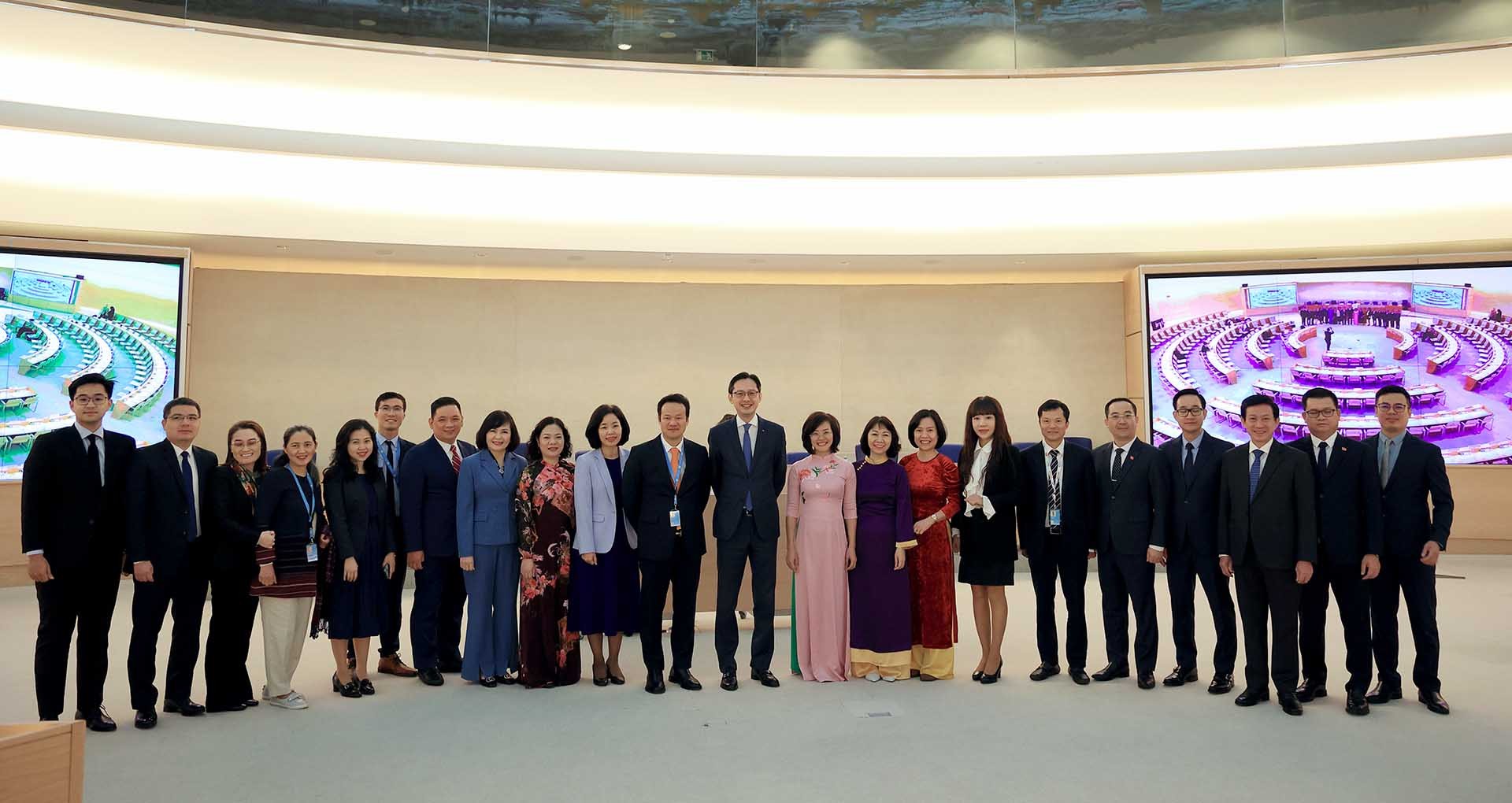
Statement by Deputy Foreign Minister Do Hung Viet at the review of Vietnam’s National Report on the UPR
Latest
 |
| Vietnamese delegation led by Deputy Minister of Foreign Affairs Do Hung Viet at the event. (Photo: VNA) |
Mr. President,
The Vietnamese delegation is very honoured to be here today for the 4th cycle of the UPR for Vietnam.
Today is a special day and this is a special place. It was exactly 70 years ago today that the battle of Dien Bien Phu ended. And it was here in the Palais des Nations that the Geneva Accords on cessation of hostilities in Indochina was signed also seven decades ago.
These are historical milestones for Vietnam and many nations around the world in our fight for liberation from colonialism, for national independence and self-determination, for peace, human rights and development.
My delegation pays tribute and is forever indebted to those who have sacrificed their lives, their blood and tears for the Vietnam we have today.
Mr. President,
Vietnam is strongly and wholeheartedly committed to the promotion and protection of human rights.
Declaring the Independence of Vietnam in 1945, President Ho Chi Minh stated, quote “Everyone is created equal. They are endowed by their Creator with certain unalienable Rights, among these are Life, Liberty and the pursuit of Happiness”, end of quote.
You may find this sounds familiar. Indeed. This was quoted from the United States Declaration of Independence, except that “all MEN” was replaced with “everyone”.
These values and this commitment to human rights are enshrined in our Constitution and laws, ensured in practice, and demonstrated through tangible results, particularly over the past four decades of Doi moi reforms.
We have seen profound transformations in the country and the lives of our people.
From a country once reliant on foreign aid, Vietnam has transformed into a leading global exporter of agricultural products, helping ensure regional and global food security.
From once one of the world’s poorest nations, Vietnam has emerged as one of the fastest-growing economies. Between 1989 and 2023, GDP per capita has increased fortyfold. Within two decades since 1993, over 40 million people have been lifted out of poverty. And within 15 years since 2005, multi-dimensional poverty has been cut by half.
Maternal and infant mortality have plummeted. Literacy rates, access to healthcare, education, and safe drinking water have all grown significantly – along with life expectancy.
As Secretary-General António Guterres put it during a visit to Vietnam in 2022, all this is quote “a powerful testament to the resilience and hard work of the Vietnamese people – and for policies that place people at the heart of development”, end of quote.
 |
| Deputy Minister of Foreign Affairs Do Hung Viet speaks at the event. (Photo: VNA) |
Mr. President,
Vietnam places great importance on the UPR and its principles of dialogue, cooperation, transparency, and mutual understanding.
For Vietnam, the UPR process goes beyond mere review and reporting responsibility. Each review cycle is approached with a genuine desire to identify areas for improvement and to take concrete actions to translate recommendations into meaningful improvements in the people’s lives.
To effectively implement accepted recommendations in the third cycle, Vietnam developed a comprehensive National Action Plan, assigning specific tasks to all relevant agencies, monitoring progress, and evaluating outcomes.
Our National Report for the fourth cycle captures the progress made in the implementation of those recommendations. The Report was prepared in a comprehensive, inclusive and transparent manner. Extensive consultations were conducted to engage all, including NGOs, social organizations, member states, development partners, and the people. Hundreds of inputs and feedback were received and well reflected in the Report.
As outlined in the Report, 239 out of 241, or 99.2% of all accepted recommendations have been implemented in full or in part.
Allow me to go into some details.
1. Significant efforts have been made to improve the country’s legal framework to better ensure human rights. During the reporting period, 45 laws and numerous important legal documents pertaining to human rights have been adopted or amended.
Some key laws include the Labour Code, the Land Law, the Law on Drugs Control, the Law on Domestic Violence… Importantly, the process of legislative development is increasingly inclusive and transparent. For instance, during the drafting of the Land Law, through various direct and online channels, over 12 million comments and suggestions were received.
2. The rapid development of the mass media, internet and social media in Vietnam has further enhanced the freedom of press, freedom of speech and the right to access information. During the reporting period, the number of internet users in Vietnam has grown by 21%, exceeding 78 million users. 25 million new broadband mobile subscribers were registered, with 4G mobile network coverage reaching approximately 99.8 percent of the total population.
3. Vietnam upholds the freedom of religion or belief and promotes equality among religions, while strictly prohibiting all forms of religion-based discrimination. Home to all major world religions - Buddhism, Catholicism, Protestantism, Islam - as well as home-grown religions like Hoa Hao Buddhism or Cao Dai, Viet Nam boasts nearly 30,000 places of worship and over 26.5 million religious followers.
Major international religious events have been held in Vietnam such as VESAK 2019, the Federation of Asian Bishops' Conference, and the Protestant Spring Love Festival in 2023, with the participation of thousands of religious dignitaries and followers. Just last December, Holy See appointed the first Resident Papal Representative and opened his Resident Office in Vietnam, a major step forward in Vietnam – Holy See relations.
4. The recognition of freedom of association dates back to Vietnam’s first Constitution in 1946, and this fundamental right has been consistently strengthened through subsequent revisions and in practice. Currently, there are about 72,000 active associations in Vietnam, making significant impacts and contributions to the sustainable socio-economic development of the country and the betterment of communities.
 |
| At the dialogue, Vietnam received about 300 recommendations encompassing a wide range of human rights issues. (Photo: VNA) |
Mr. President,
5. Vietnam was not spared from the unprecedented impacts of the COVID-19 pandemic. It cost our people’s lives, widened the inequality, and impeded the enjoyment of the people’s human rights.
In face of these challenges, Vietnam took a whole-of-government and whole-of-society approach, swiftly implemented robust and coordinated measures, giving top priority to ensuring the health and livelihoods of the people.
6. Social welfare packages worth nearly USD 4 billion, or 1% of our GDP, were effectively allocated for specific groups, including affected workers and impoverished households. Thanks to these measures and poverty reduction efforts, Vietnam’s multidimensional poverty continued to decrease by 1.8% from 2022, standing at 5.7% in 2023.
7. Ensuring the right to health was a top priority. Vietnam carried out the largest vaccination campaign in our history. In just over two years, 266 million Covid-19 vaccine doses have been administered to almost the entire population over 12 years of age.
Healthcare services were recovered promptly. The resilience and responsiveness of the preventive healthcare system were strengthened. At the end of 2023, health insurance coverage reached nearly 94% of the population.
8. Gender equality and women’s empowerment is another area of significant improvements. In 2023, Vietnam’s gender equality index ranked 72nd out of 146 countries, moving up from its 87th position in 2021.
And Vietnam recently adopted its first National Action Plan on Women, Peace and Security, and has surpassed the set target for female participation in peacekeeping operations.
9. Vietnam believes that success in promoting and protecting human rights is closely tied to the achievement of the Sustainable Development Goals to “leave no one behind”.
The realization of SDGs necessitates sustained economic growth. Despite the challenges posed by the pandemic, the country’s GDP has regained its momentum, reaching a record high of 8% in 2022 and 5% in 2023.
During the reporting period, Vietnam’s GDP per capita has grown by 25%.
And according to the latest UNDP Human Development Report, Vietnam continues to ascend in its HDI rankings, climbing from 115 to 107.
10. As a country heavily affected by climate change, Vietnam recognizes the intersection between climate change and human rights. We are strongly committed to achieving the goal of net-zero emissions by 2050 and transitioning towards a green economy.
This includes prioritizing support for vulnerable groups and ensuring their access to affordable energy and sustainable jobs. This also includes upholding transparency, and an inclusive, participatory and just approach, particularly when it comes to involving relevant stakeholders affected by the energy transition process.
11. Vietnam believes that genuine dialogue and cooperation are the most effective means to promote and protect human rights and to foster tolerance, inclusion, unity, and respect for diversity.
Vietnam has engaged actively with the HRC Special Procedures and always responded to requests for information and feedback. Last November, the Special Rapporteur on the Right to Development visited Vietnam at our invitation.
Vietnam remains committed to fulfilling its obligations and commitments under international human rights treaties to which it is a party. Following constructive dialogues with the treaty bodies, Vietnam gives due consideration to their observations and recommendations in our action plans to implement these treaties.
 |
| Deputy Minister of Foreign Affairs Do Hung Viet and members of Vietnamese delegation at the event. (Photo: VNA) |
Mr. President,
12. The progress made must not be a ground for complacency as challenges and difficulties remain.
Despite significant poverty reduction achievements, 800,000 Vietnamese families are still living in poverty. The rich-poor gaps in different regions and population groups remain. Malnutrition among children under 5 years of age remains high.
Notwithstanding overall progress, women are still the major providers of unpaid care and domestic work. Violence against women and girls persists.
Vietnam’s limited financial, technology, and human resources are major barriers to providing sufficient social security and welfare to all citizens, including care services to vulnerable groups.
Much more needs to be done to improve the provision of administrative services, including the attitude and capabilities of public servants and the quality of the services. Legal and policy frameworks on human rights must be further enhanced and better implemented to meet the growing expectations of the people.
13. Such realities serve as a reminder and an impetus for Vietnam’s continued efforts to better protect and promote human rights.
Vietnam will continue to put emphasis on building a law-governed socialist state, advance public administration reforms and strengthen grassroots democracy.
Vietnam will continue to fulfill our obligations under international human rights treaties to which it is a party. We will promote dialogue and cooperation with all countries and UN human rights mechanisms, in the spirit of equality, mutual respect, and respect for the UN Charter and international law.
We will advance human rights education, including training and capacity building for government officials, public servants, businesses, and the people.
We will work to achieve the SDGs, and better ensure the enjoyment of all civil, political, economic, social, and cultural rights for all, with particular attention given to vulnerable groups. Gender equality and women’s empowerment will continue to be central to our country’s social-economic development. Efforts will be made to enable an inclusive and just transition towards a green and digital economy.
14. Guided by these values and commitments, as a member of the Human Rights Council and a candidate to the Council for the term 2026-2028, our priorities include enhancing the efficiency of the Council’s work, protecting vulnerable groups, promoting the right to health and the right to quality education, addressing the intersection of climate change and human rights, and promoting human rights education, to name a few.
Mr. President,
My delegation welcomes the opportunity to engage with all member states and looks forward to an open and constructive dialogue and receiving valuable recommendations today.
We shall make every effort to respond to all comments during the interactive session, time permitting.
I Thank you, Mr. President.













